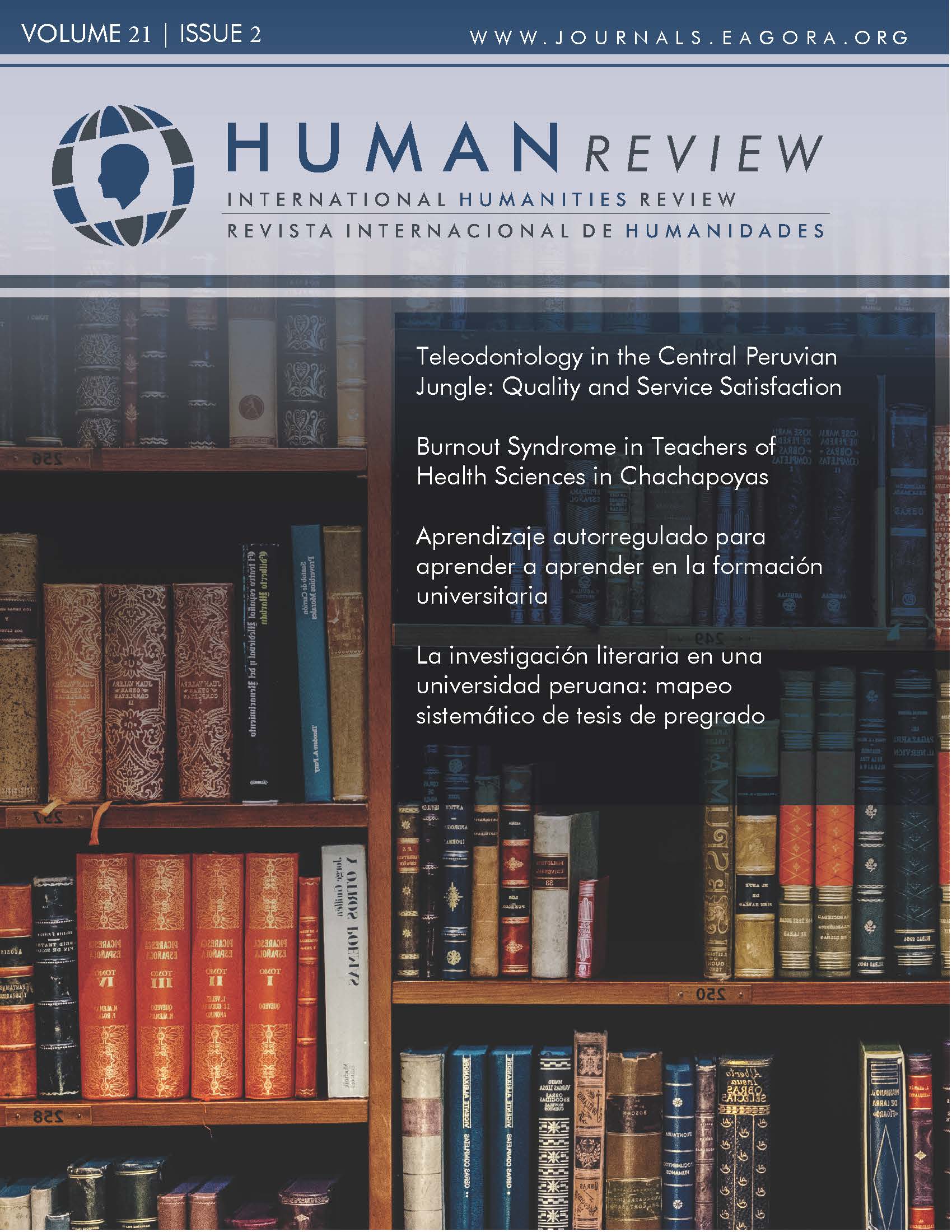Didactic Interactions in Blended Learning: Dynamics of Knowledge Construction
DOI:
https://doi.org/10.37467/revhuman.v21.5082Keywords:
Blended Learning, Didactic interaction, Meaningful learning, E-learning, In-person attendance, Collaborative participation, Educational practiceAbstract
The study examines a Blended Learning course to identify patterns of didactic interaction that facilitate knowledge construction and, consequently, learning. The research reveals a transition towards virtuality from in-person interactions, gradual acquisition of learning, and a focus on autonomy. These transitions indicate greater development of significant content in virtual environments, suggesting a relationship between intensified virtual interaction, learning, and reduced dependence on the teacher. The analysis of educational practice in Blended Learning promotes autonomy, achievements, and participation through peer collaboration and increased social interaction, leading to notable outcomes.
References
Anhwere, K, Arkorful, V., Appiah, F., Agyapong, E., y Acheampong, E. (2023). The impact of blended learning on students using the IBOX platform: Initial perspectives of teachers. Helyon, 9(3), e14297. https://doi.org/10.1016/j.heliyon.2023.e14297 DOI: https://doi.org/10.1016/j.heliyon.2023.e14297
Christensen, C., Horn, M. y Staker, H. (2013). Is K-12 blended learning disruptive? An introduction of the theory of hybrids. Clayton Christensen Institute. https://www.christenseninstitute.org/wp-content/uploads/2013/05/Is-K-12-Blended-Learning-Disruptive.pdf
Da Silva, K. & Behar, P. A. (2017). Digital competence model of distance learning students. In International Association for Development of the Information Society (IADIS), International Conference on Cognition and Exploratory Learning in Digital Age (pp. 109-116), Algarve, Portugal, 18-20 de octubre. https://eric.ed.gov/?id=ED579459
Esquivel-Grados, J., Venegas-Mejía, V.L., Venegas-Mejía, C.P., Gonzales-Benites, M.T., Bacón-Salazar, N. y Valdivia-Huaranga, H.A. (2023). Formative research: perceptions of communication science students at a peruvian university. Journal of Technology and Science Education, 13(2), 565-582.http://dx.doi.org/10.3926/jotse.1758 DOI: https://doi.org/10.3926/jotse.1758
Elia, G., Secundo, G., Assaf, W. & Fayyoumi, A. (2014). Web 2.0 blended learning to introduce e-Business contents in engineering education: A pilot case study in Jordan. International Journal of Engineering Education, 30(3), 543-559. http://www.research.lancs.ac.uk/portal/en/publications/web-20-blended-learning-to-introduce-ebusiness-contents-in-engineering-education(b7068866-cdfa-4e7d-9918-d4b115b3bb83).html
García Aretio, L. (2018). Blended learning y la convergencia entre la educación presencial y a distancia. RIED. Revista Iberoamericana de Educación a Distancia, 21(1), 25-32. https://doi.org/10.5944/ried.21.1.19683 DOI: https://doi.org/10.5944/ried.21.1.19803
Hilliard, A. T. (2015). Global blended learning practices for teaching and learning, leadership and and professional development. Journal of International Education Research, 11(3), 179-188. https://doi.org/10.19030/jier.v11i3.9369 DOI: https://doi.org/10.19030/jier.v11i3.9369
Krismadinata, K., Verawardina, U., Jalinus, N., Rizal, F., Sukardi, S., Sudira, P., Ramadhani, D., Lubis, A., Friadi, J., Arifin, A. S. y Novaliendry, D. (2020). Blended Learning as Instructional Model in Vocational Education: Literature Review. Universal Journal of Educational Research, 8(11B), 5801-5815. https://doi.org/10.13189/ujer.2020.082214 DOI: https://doi.org/10.13189/ujer.2020.082214
Laplagne, C. y Urnicia, J. (2023). Protocolos de b-learning para la alfabetización informacional en la Educación Superior. Región Científica, 2(2), 202373. https://doi.org/10.58763/rc202373 DOI: https://doi.org/10.58763/rc202373
Marqués, A., Rodrigues, E. y Fortes, R. (2017). Building a Virtual Learning Environment to Foster Blended Learning Experiences in an Institute of Application in Brazil. Open Praxis, 9(1), 109-120. https://doi.org/10.5944/openpraxis.9.1.455 DOI: https://doi.org/10.5944/openpraxis.9.1.455
Mulyadi, D., Arifani, Y., Wijayantingsih, T. D. y Budiastuti, R. (2020). Blended Learning in English for Specific Purposes (ESP) Instruction: Lecturers’ Perspectives. Computer-Assisted Language Learning Electronic Journal, 21(2), 204-219. http://callej.org/journal/21-2/Mulyadi-Arifani-Wijayantingsih-Budiastuti2020.pdf
Quitián-Bernal, S. y González-Martínez, J. (2020). El diseño de ambientes blended learning: retos y oportunidades. Educación y Educadores, 23(4), 659-682. https://doi.org/10.5294/edu.2020.23.4.6 DOI: https://doi.org/10.5294/edu.2020.23.4.6
Ramírez-Sosa, M. y Peña-Estrada, C. (2023). B-learning para mejorar el proceso de enseñanza y aprendizaje. Revista Tecnológica-Educativa Docentes 2.0, 15(2). https://doi.org/10.37843/rted.v15i2.309 DOI: https://doi.org/10.37843/rted.v15i2.309
Sánchez, E., García, R., Castellano, N., de Sixte, R., Bustos, A. y García, H. (2008) Qué, cómo y quién: tres dimensiones para analizar la práctica educativa. Cultura y Educación, 20(1), 95-118. http://doi.org/10.1174/11356400878378143 DOI: https://doi.org/10.1174/113564008783781431
Segovia-García, N. y Said-Hung, E. (2021). Factores de satisfacción de los alumnos en e-learning en Colombia. Revista Mexicana de Investigación Educativa, 26(89), 595-621. http://www.scielo.org.mx/scielo.php?script=sci_arttext&pid=S1405-66662021000200595&lng=es&tlng=es
Semanate-Quiñonez, H., Upegui-Valencia, A., y Upequi-Valencia, M. (2021). Blended Learning, avances y tendencias en la educación superior: una aproximación a la literatura. Informador Técnico, 86(1), 30 - 52. https://doi.org/10.23850/22565035.3705 DOI: https://doi.org/10.23850/22565035.3705
Soler, R., Soler, J. y Araya, I. (2017). Subjects in the blended learning model design. Theoretical-methodological elements. Procedia. Social and Behavioral Sciences, 237, 771-777. https://doi.org/10.1016/j.sbspro.2017.02.120 DOI: https://doi.org/10.1016/j.sbspro.2017.02.120
Sosa D., y Valverde-Berrocoso, J. (2017). Las macro-políticas educativas y el Proyecto de Educación Digital para la integración de las tecnologías desde la visión del profesorado. Revista de Educación a Distancia, 53(3). http://dx.doi.org/10.6018/red/53/3 DOI: https://doi.org/10.6018/red/53/3
Turpo Gebera, O. (2015). Perspectiva de la convergencia pedagógica y tecnológica en la modalidad blended learning. Revista de Educación a Distancia, (39). https://revistas.um.es/red/article/view/234261
Turpo-Gebera, O. y Garcia-Peñalvo, F. (2020). Blended learning: convergence between technology and pedagogy. En Martin-Ga Blended Learning: Convergence between Technology and Pedagogy. In A., Martin-Garcia. (Ed.). Blended Learning: Convergence between Technology and Pedagogy (pp. 271-293). Springer. https://link.springer.com/book/10.1007/978-3-030-45781-5 DOI: https://doi.org/10.1007/978-3-030-45781-5_13
Turpo-Gebera, O. (2021). Interacción didáctica y construcción social del conocimiento en la modalidad b-learning: Perú como estudio de caso [Tesis doctoral], Universidad de Salamanca, España. https://repositorio.grial.eu/handle/grial/2323 DOI: https://doi.org/10.31237/osf.io/a28kq
Turpo-Gebera, O., Pérez-Postigo, G., Diaz-Zavala, R., Venegas-Mejía, V., y Esquivel Grados, J. (2023). Competencias informacionales en la formación inicial del profesorado de una universidad peruana. HUMAN REVIEW. International Humanities Review, 16(4), 1–11. https://doi.org/10.37467/revhuman.v16.4994 DOI: https://doi.org/10.37467/revhuman.v16.4994
Valverde-Berrococo, J. y Balladares B., J. (2017). Enfoque sociológico del uso del b-Learning en la educación digital del docente universitario. Sophia, (23), 123-140. https://doi.org/10.17163/soph.n23.2017.04 DOI: https://doi.org/10.17163/soph.n23.2017.04
Vanslambrouck, S., Zhu, C., Lombaerts, K., Philipsen, B. y Tondeur, J. (2018). Students’ motivation and subjective task value of participating in online and blended learning environments. The Internet and Higher Education, 36. 33-40. https://doi.org/10.1016/j.iheduc.2017.09.002 DOI: https://doi.org/10.1016/j.iheduc.2017.09.002
Wang, Y., Han, X. y Yang, J. (2015). Revisiting the blended learning literature: Using a complex adaptive systems framework. Educational Technology & Society, 18(2), 380-393. https://www.researchgate.net/publication/282686856_Revisiting_the_Blended_Learning_Literature_Using_a_Complex_Adaptive_Systems_Framework
Downloads
Published
How to Cite
Issue
Section
License
Those authors who publish in this journal accept the following terms:
- Authors will keep the moral right of the work and they will transfer the commercial rights.
- After 1 year from publication, the work shall thereafter be open access online on our website, but will retain copyright.
- In the event that the authors wish to assign an Creative Commons (CC) license, they may request it by writing to publishing@eagora.org









